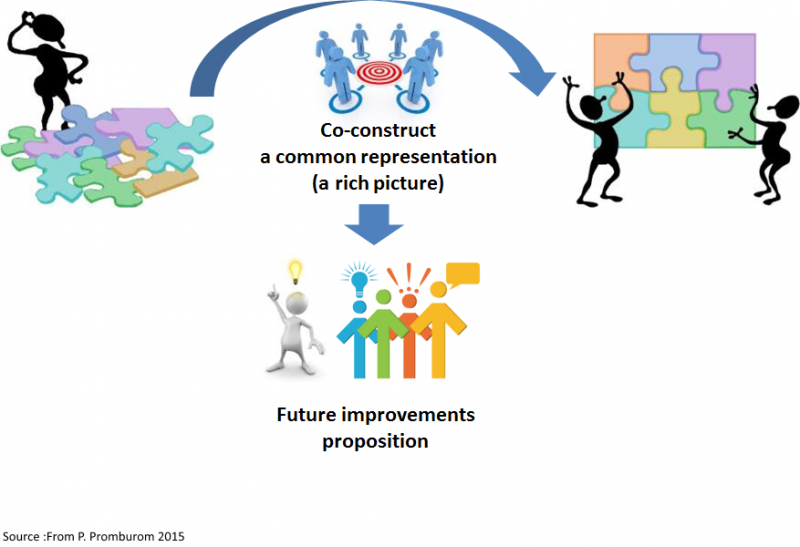You are here
To set up a Community of Practice
We propose to implement a participatory modelling approach (“companion modelling”) to set up a community of practice.
What is Participatory Modelling ("Companion modelling") ?
Participatory Modelling or Companion Modelling (ComMod association, © ComMod 2010) is a participatory methodology that has been developed for collective decision-making, research and institutional coordination. Participatory Modelling approach considers the different types of knowledge, objectives and perceptions held by the different stakeholders to shape a shared representation of the socio-ecological system. This representation has the form of one or several conceptual models (diagrams, charts, texts, etc.). Then the conceptual models are used to design role-playing games involving the stakeholders. Role-playing games can be totally or partially implemented on a computer.
They enable the stakeholders to generate and play different scenarios, and then evaluate different strategies while learning about the consequences of their decisions in interaction with each-other. The resulting co-designed models are not intended to be used for foresight. They form a shared representation of the system of interest between stakeholders. The main idea is that companion modelling, by rendering explicit the ecological and epidemiological processes as well as actors’ strategies, can be used by stakeholders themselves to deal with their own problems to identify mutually accepted solutions and consultation pathways. The role of the playing games associated or not with computational models is to support the modelling process in an iterative manner, trough participative simulation and game sessions.
Participatory modelling is an interactive process facilitated by evolving models used to mediate and to support dialogue and to encourage shared learning & collective decision-making. The modelling and simulation activities are driven by end-users interest. Stakeholders (incl. researchers) learn together by creating, modifying, observing and assessing simulations. As Participatory Modelling is an iterative approach, knowledge and perceptions evolve over time and can lead to collective action plans and better stakeholders’ mobilization to implement them.
The originality of this approach is that stakeholders will be able to identify, through a consultation process, to which issues they could share joint interest, in order to assert win-win solutions. Throughout the Participatory Modelling activities, we will set up an iterative and continuous process of communication and knowledge sharing across sectors and disciplines.
Who are the actors ?
We propose to implement a participatory modelling approach (“companion modelling”) to set up a community of practice amongst stakeholders from Public Health, Animal Health, Environment management, Agriculture, and Rural Development. It involves the different type of actors of a given socio- ecological system. A socio-eco system considers ecology and social sciences in a broad sense, embedding biology, epidemiology, environmental sciences and economy for instance.
We propose to bring together the stakeholders of each case study for the prioritization of the relevant processes in the system, the field protocol designs, the data collection/management/analysis and debriefings. It will reveal divergences in risk perception, regarding their fields of expertise or sector of intervention.
What is the place of the case studies ?
Within the implementation of 3 case studies, Participatory modelling facilitators will also be aware to take into account “loss of power” for traditional dominant sectors (from human and veterinarian public health sector) and to promote awareness of physicians and veterinarians to an environmental health approach. Altogether, the 3 case studies address a large range of questions raised in the framework of health risk management and public health in a One Health perspective. Joint workshops for cross- cutting restitutions sessions once a year will allow knowledge sharing and holistic understanding of these issues, fed by each case study’s outcomes.
Partners and associates conducting the participatory modelling process throughout the 3 case studies implementation will make sure that ecology, economy and social sciences are utilized in order to improve holistic understanding of the epidemiological systems at play. Beyond a biomedical approach of health risks management, ecosystem services for disease regulation (cf MEA 2005), local perceptions of diseases and risks, behavioral and environmental risk factors will notably be highlighted.






